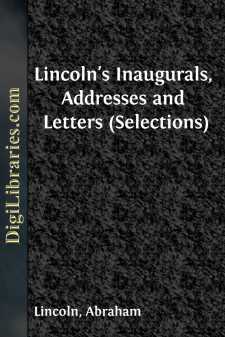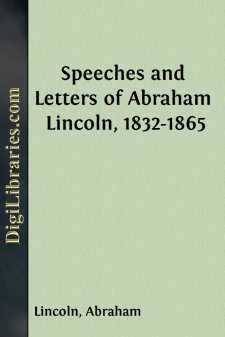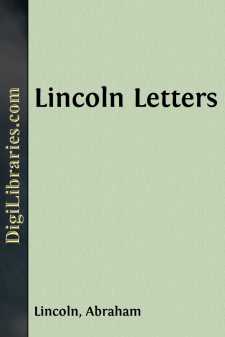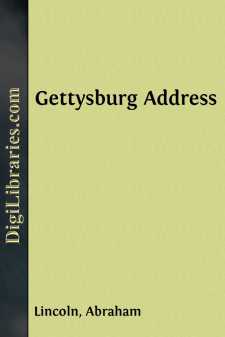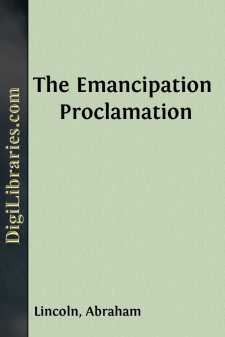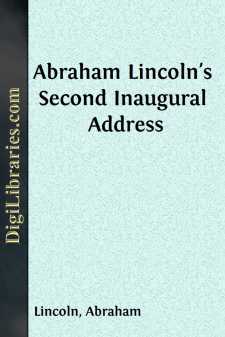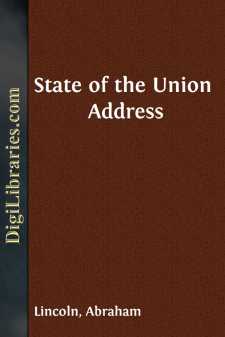Categories
- Antiques & Collectibles 13
- Architecture 36
- Art 48
- Bibles 22
- Biography & Autobiography 813
- Body, Mind & Spirit 142
- Business & Economics 28
- Children's Books 17
- Children's Fiction 14
- Computers 4
- Cooking 94
- Crafts & Hobbies 4
- Drama 346
- Education 46
- Family & Relationships 57
- Fiction 11829
- Games 19
- Gardening 17
- Health & Fitness 34
- History 1377
- House & Home 1
- Humor 147
- Juvenile Fiction 1873
- Juvenile Nonfiction 202
- Language Arts & Disciplines 88
- Law 16
- Literary Collections 686
- Literary Criticism 179
- Mathematics 13
- Medical 41
- Music 40
- Nature 179
- Non-Classifiable 1768
- Performing Arts 7
- Periodicals 1453
- Philosophy 64
- Photography 2
- Poetry 896
- Political Science 203
- Psychology 42
- Reference 154
- Religion 513
- Science 126
- Self-Help 84
- Social Science 81
- Sports & Recreation 34
- Study Aids 3
- Technology & Engineering 59
- Transportation 23
- Travel 463
- True Crime 29
Lincoln's Inaugurals, Addresses and Letters (Selections)
by: Abraham Lincoln
Categories:
Description:
Excerpt
INTRODUCTION
The facts of Lincoln's early life are best stated in his own words, communicated in 1859[see Appendix] to Mr. J. W. Fell, of Bloomington, Illinois. Unlike many men who have risen from humble surroundings, Lincoln never boasted of his wonderful struggle with poverty. His nature had no room for the false pride of a Mr. Bounderby, even though the facts warranted the claim. Indeed, he seldom mentioned his early life at all. On one occasion he referred to it as "the short and simple annals of the poor." Lincoln himself did not in any way base his claims to public recognition upon the fact that he was born in a log cabin and that he had split rails in his youth, although, on the other hand, he was not ashamed of the facts. More, perhaps, than any other man of his time he believed and by his actions realized the truth of Burns' saying, "The man's the goud, for a' that." The real lesson to be drawn from Lincoln's life is that under any conditions real success is to be won by intelligent, unwavering effort, the degree of success being determined by the ability and character of the individual. Still less profitable is the attempt to contrast the success of Lincoln with that of Washington, or Jefferson or of any other American whose early circumstances were more favorable than Lincoln's. In each case success has been worthily won, and we Americans of the present generation should rejoice that our country has produced so many great men. True patriotism does not consist in the recognition of only one type of Americanism, but rather in the grateful acceptance of every service that advances the fortunes and raises the reputation of the republic. Peculiar interest attaches to the character of Lincoln's early reading and especially to the small number of books that were accessible to him. In these days of cheap and plentiful literature it is hard for us to realize the conditions in pioneer Kentucky and Indiana, where half a dozen volumes formed a family library and even newspapers were few and far between. There was no room for mental dissipation, and the few precious volumes that could be obtained were read and re-read until their contents were fully mastered. When Sir Henry Irving was asked to prepare a list of the hundred best books he replied, "Before a hundred books, commend me to the reading of two, the Bible and Shakespeare." Fortunately these two classics came at an early age within the reach of Lincoln and the frequency with which he quotes from both at all periods of his career, both in his writings and in his conversation, shows that he had made good use of them. The boy Lincoln not only read books, he made copious extracts from them, often using a smooth shingle in the absence of paper and depending upon the uncertain light of the log fire in his father's cabin. Such use of books makes for intellectual growth, and much of Lincoln's later success as a writer can be referred back to this careful method of reading.
Lincoln's later reading shows considerable variety within certain limits....


